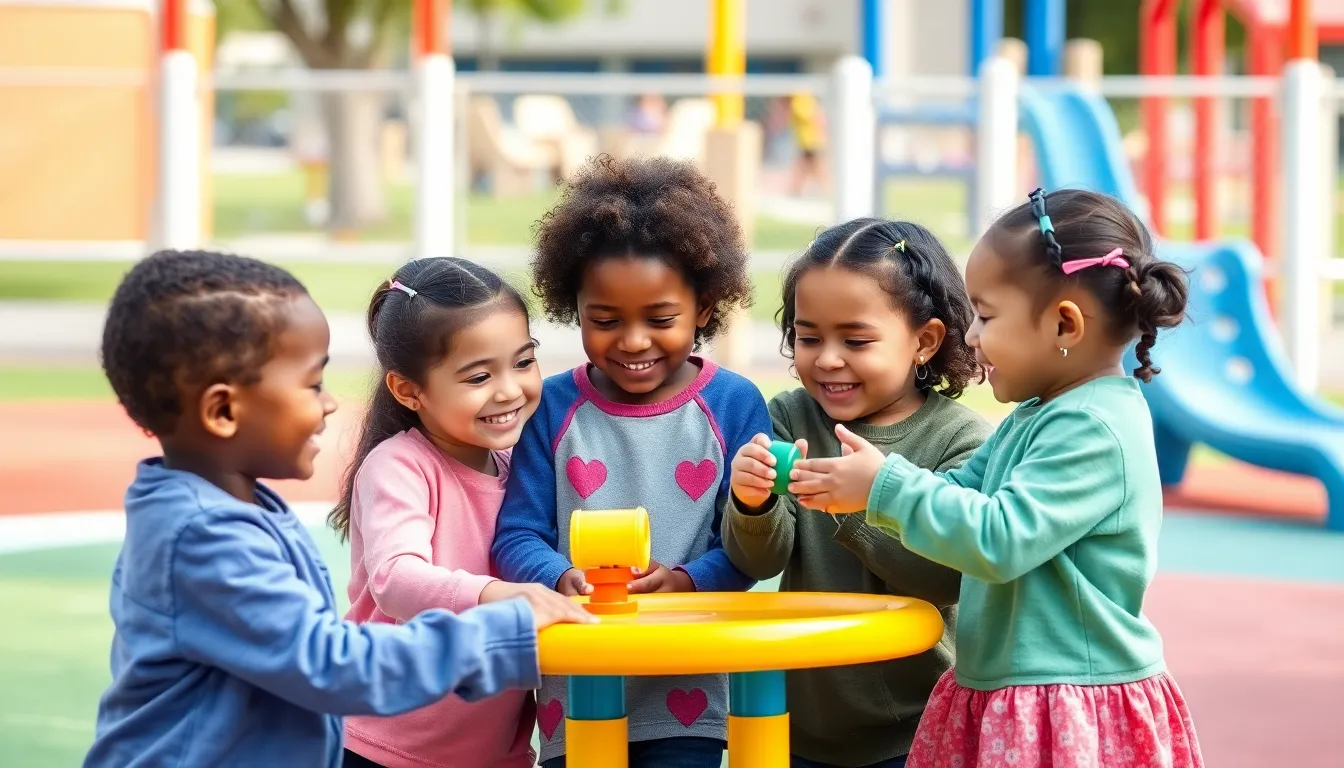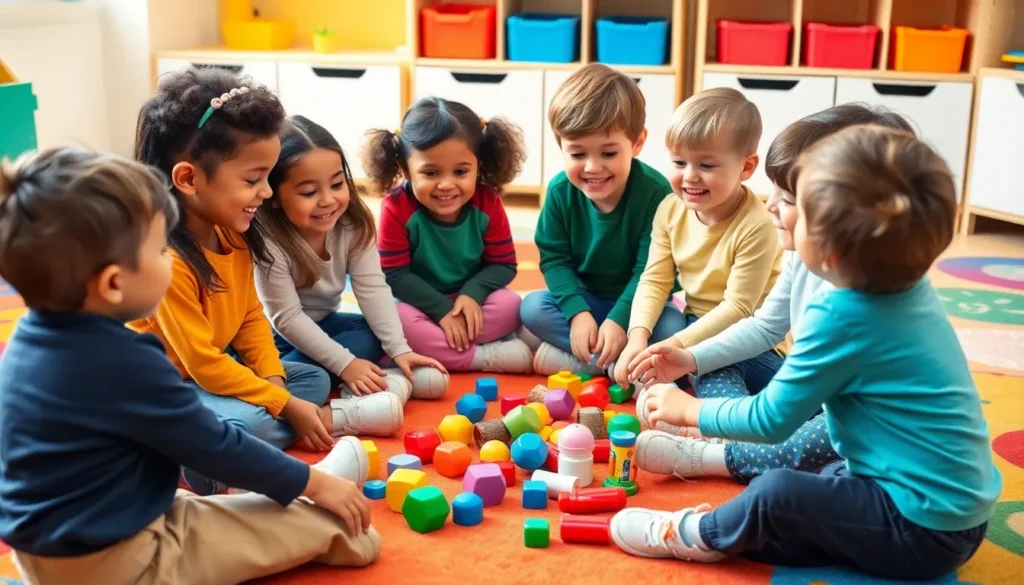Table of Contents
ToggleIn a world where tiny humans are mastering the art of tantrums and snack negotiations, social emotional learning (SEL) for preschoolers is the secret sauce for turning chaos into harmony. Imagine a classroom where kids not only learn their ABCs but also how to share, empathize, and express their feelings—without resorting to a full-on meltdown over a misplaced toy.
Understanding Social Emotional Learning for Preschoolers
Social emotional learning fosters essential skills in preschoolers. Emotional awareness forms the foundation of social interactions. Empathy enables children to understand the feelings of others, enhancing relationships. Sharing helps create a cooperative environment, making playtime more enjoyable.
Self-regulation allows preschoolers to manage their emotions during challenging situations. When they experience frustration, strategies like deep breathing can assist in calming down. Conflict resolution skills provide tools for navigating disagreements, reducing the likelihood of tantrums.
The development of these skills influences academic success significantly. Children proficient in social emotional skills engage more effectively with peers and teachers. Positive interactions contribute to a collaborative classroom atmosphere, fostering a love for learning.
Programs that integrate SEL into daily routines help reinforce these lessons. Activities such as group games and storytelling provide opportunities for practicing social skills. Regular discussions about emotions and strategies to cope with them deepen understanding.
Assessment of growth in these areas often takes place through observation. Teachers track behaviors during play and group activities, noting improvements. Feedback from parents further enriches this understanding, providing a holistic picture of each child’s progress.
Overall, social emotional learning equips preschoolers with vital skills that benefit their emotional and social development. Implementing SEL practices supports not only positive behavior but also academic achievement.
Importance of Social Emotional Learning

Social emotional learning (SEL) lays the groundwork for preschoolers to thrive in both emotional and social domains. Children who develop these skills early create a solid foundation for future interactions.
Benefits for Child Development
Social emotional learning fosters emotional awareness, enabling preschoolers to identify and express their feelings. Children learn vital skills like empathy and sharing, essential for building strong relationships. Developing self-regulation aids in managing responses during stressful moments. Additionally, preschoolers learn conflict resolution, equipping them with strategies to navigate disagreements peacefully. Cooperative play enhances teamwork and nurtures a supportive environment. These benefits collectively promote healthy emotional development, ensuring children feel confident and secure during their formative years.
Impact on Academic Success
Proficiency in social emotional skills directly correlates with higher academic achievement. Preschoolers who engage effectively with their peers and teachers foster a collaborative classroom atmosphere. Engagement in group activities boosts communication skills and enhances teamwork. Teachers observe that children with strong SEL skills demonstrate better focus and persistence with tasks. Additionally, SEL supports problem-solving abilities, enabling preschoolers to approach challenges constructively. Schools that incorporate SEL into curricula witness a notable increase in student participation and overall learning outcomes.
Strategies for Implementing Social Emotional Learning
Effective strategies enhance social emotional learning in preschoolers. Engaging children in specific activities and involving parents strengthens the SEL foundation.
Classroom Activities
Incorporating interactive classroom activities fosters social emotional skills. Role-playing scenarios allows children to practice empathy and conflict resolution. Incorporating games focused on sharing promotes cooperation among peers. Storytime discussions around characters’ feelings teach emotional awareness. Creative arts projects encourage expression and self-regulation. Frequent group activities facilitate teamwork and communication, strengthening relationships. Implementing daily check-ins supports open discussions about emotions. These activities collectively create a nurturing environment for developing essential skills.
Parent Involvement
Active parent involvement reinforces social emotional learning at home. Encouraging parents to participate in school activities strengthens connections between home and school. Sharing resources, such as books and activities, helps parents support their child’s emotional growth. Suggesting parents discuss emotions regularly promotes understanding and expression. Empowering parents to model SEL behaviors creates consistency for children. Regular communication between teachers and parents fosters a collaborative approach to learning. Workshops on SEL strategies provide valuable tools for parents. Together, these efforts form a cohesive support system for developing social emotional skills.
Challenges in Social Emotional Learning
Social emotional learning for preschoolers faces several challenges that educators and parents must address.
Identifying Emotional Needs
Recognizing emotional needs in preschoolers poses difficulties. Children often lack the vocabulary to express their feelings clearly. They might display emotions through behavior instead of words, complicating understanding. Observational skills become essential for teachers during playtime to identify signs of distress or frustration. Additionally, training staff in recognizing emotional cues can enhance their ability to support children’s needs. Sorting through these emotional signals helps create a foundation for effective SEL strategies. Creating a safe environment encourages children to share their feelings openly, promoting emotional awareness and understanding.
Overcoming Barriers in Implementation
Implementing social emotional learning in preschool settings brings unique barriers. Time constraints often limit teachers from dedicating sufficient time to SEL activities. School curricula that prioritize academic subjects may also overshadow emotional education. Limited resources can hinder the incorporation of diverse SEL strategies like creative arts or group activities. Active involvement from parents is crucial for reinforcing SEL at home and ensuring consistency. Building partnerships between educators and families fosters a more comprehensive approach to emotional learning. Addressing these barriers requires collaborative efforts to integrate SEL into everyday classroom practices, ensuring children develop vital social emotional skills.
Social emotional learning for preschoolers is essential for nurturing their emotional and social development. By fostering skills like empathy and self-regulation, children are better equipped to handle their emotions and interact positively with others. This foundational learning not only enhances their relationships but also supports academic success.
Implementing effective SEL strategies in preschool settings creates an engaging environment where children can thrive. With the involvement of parents and educators, children gain consistent support in their emotional growth. Prioritizing social emotional learning ensures that preschoolers are prepared for future challenges, laying the groundwork for a lifetime of healthy interactions and academic achievement.




